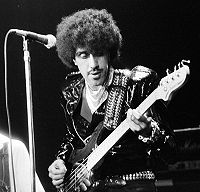Phil Lynott Musical artist
Philip Parris "Phil" Lynott (/ˈlaɪnət/; 20 August 1949 – 4 January 1986) was an Irish musician, singer and songwriter. His most commercially successful group was Thin Lizzy, of which he was a founding member, the principal songwriter, lead vocalist and bassist. He later also found success as a solo artist.Growing up in Dublin in the 1960s, Lynott fronted several bands as a lead vocalist, most notably Skid Row alongside Gary Moore, before learning the bass guitar and forming Thin Lizzy in 1969. After initial success with "Whiskey in the Jar", the band found strong commercial success in the mid-1970s with hits such as "The Boys Are Back in Town", "Jailbreak" and "Waiting for an Alibi", and became a popular live attraction due to the combination of Lynott's vocal and songwriting skills and the use of dual lead guitars. Towards the end of the 1970s, Lynott also embarked upon a solo career, published two books of poetry, and after Thin Lizzy disbanded, he assembled and fronted the band Grand Slam, of which he was the leader until it folded in 1985.He subsequently had major UK success with Moore with the song "Out in the Fields", followed by a minor hit "Nineteen", before his death on 4 January 1986. He remains a popular figure in the rock world, and in 2005, a statue was erected in his memory.
Search
Musical artist
| Career started | 1965 |
|---|---|
| associated musical artist | |
| Background | Solo singer |
| genre | |
| instrument | |
| record label |
